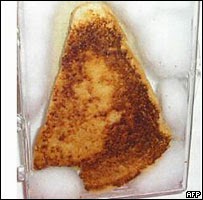Now I like toast just as much as the next person, but even if my toast had a miraculous apparition of the Virgin Mary burned into its surface like this miracle slice (didn't see it, heathen?), I can't imagine it would be worth those dollars to me. And I am one who has experienced breakfast at the Waldorf where a fresh piece of toast cost ten bucks (with orange juice, it comes to $19.95, not counting tip), so I should know toast.
How do we know this is THE Virgin Mary? Well, when the original owner was about to take a bite out of her sandwich, she notice "the Lady" staring back at her and hollered for her husband to "COME QUICK!" "I scared me at first," she said. Then, shortly thereafter, she won $70,000 at a nearby casino.
 |
| potato chip Jesus |
But that's not today's story. Today's story is about how things like this happen...the psychological phenomenon of seeing something significant in ambiguous stimuli. That is called pareidolia say those who study such things. (Yeah, somebody's got to study everything.)
Another interesting study might be on what causes a person to pay $28 million for a ten-year-old piece of toast.
 |
| A pizza for Christ's sake |
Over a series of tests too dull to describe, moral content seemed to enhance recognition of anything at a greater perception than non-moral content. That phenomenon is called the "moral pop-out effect." It is described in a general sense like grocery shopping when you are hungry versus when you are not hungry. When you are hungry, the sight and aura of food calls your name. When you are full, forget it Charlie.
 |
| Cheeto Jesus (really?) |
Interestingly, test subjects recalled more of stories with morally acceptable content than those without. An example used was a fabricated newspaper clipping of a perpetrator of a vicious crime who was still on the loose. That version scored considerably less in remembered detail than the exact same fake story where the perpetrator was apprehended.
There is much more, of course, but being a non-scientist, if you get the gist, that's good enough for me.
 |
| Cubs win! Cubs win! |





No comments:
Post a Comment